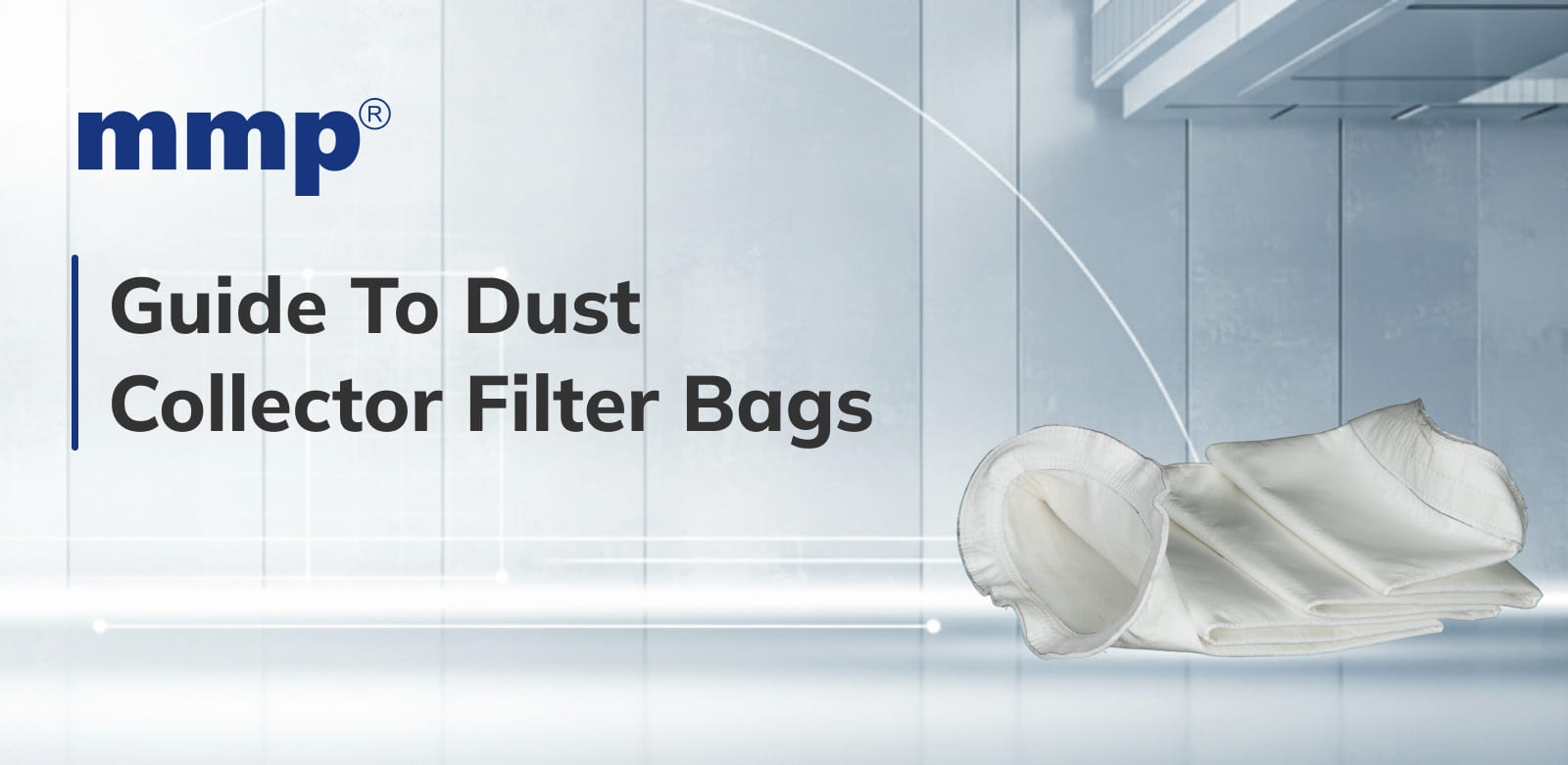Menu
Guide to Dust Collector Filter Bags
Oct 30 2025

In the modern industrial atmosphere, controlling dust and particulate emissions is not only a regulatory requirement; it is a requirement for safety, efficiency, and product quality, whether in a cement plant, metals processing plant, pharmaceutical manufacturing plant, or woodworking workshop. Controlling airborne dust is vital to ensure employee safety and equipment protection.
A dust collector filter bag is widely recognized as one of the most effective components used in contemporary air pollution control systems. The terms filter bag, baghouse collector filter, fabric bag, and industrial dust collector air filter bag all describe the same item, which is an important component of a baghouse. The purpose of a baghouse is to separate dust particles from the airstream to achieve cleaner operations and meet threshold air quality levels and standards set internationally.
In this complete guide, we will cover: what dust collector filter bags are, how they work, the types and fabrics of dust collector filter bags, the applications in industry, and why you should consider a reputable manufacturer like mmp Filtration Pvt. Ltd, a worldwide supplier of dust collection filter bags.
What Are Dust Collector Filter Bags?
Dust collector filter bags are unique textile components utilized in dust collecting processes to filter or separate dust from the air or gas stream. Filter bags are created to capture particles, allowing clean air to pass through, protecting worker safety and ensuring regulatory compliance and operational efficiency.
Filter bags use mechanical filtration, which is different from cartridge filters and electrostatic precipitators. As dust-laden air flows through the fabric, particles are trapped on the bag surface or on the felted media. Over time, a "dust cake" forms, which enhances the filtration performance.
Since 2003, mmp Filtration Pvt. Ltd. has been at the forefront of industrial and liquid filtration. mmp is based in Ahmedabad, India, and manufactures and supplies a range of quality Dust Collector Bags, high-temperature fabric Bags, and Baghouse Collector Filters to customers in the USA, UK, Australia, and the UAE. Their advanced manufacturing technology, along with their rigorous quality assurance, stands as their proof of being a supplier of choice for many industries around the world.
How Dust Collector Filter Bags Work
A baghouse dust collector operates with a simple yet effective principle. Dust-laden air goes into the housing and flows through vertically arranged bags, made of fabric, that are the filter. The gas passes through the fabric and leaves the dust particles behind.
Buildup of dust forms a filter cake, which increases filtering efficiency. When the differential pressure exceeds a certain level, cleaning mechanisms such as pulse-jet air blasts, reverse air, or mechanical shaking will dislodge the dust cake and allow it to drop into a hopper for disposal.
mmp Filtration produces quality bags for dust collection that fit with all major baghouse systems designed to exact fitment specifications while maintaining operable longevity. mmp Filtration's knowledge of fabric selection and fabric consistency in manufacturing will also help reduce pressure drops, energy consumption, and maintenance costs.
Types of Dust Collector Filter Bags
1. Based on Cleaning Method
- Pulse-Jet Bags –Found a lot in contemporary plants. They are cleaned with a burst of compressed air when the systems are online.
- Reverse-Air Bags – Cleaned by using reversed airflow, which will clean more gently cycle.
- Shaker Bags– Fit neatly over a mechanical shaker that shakes the bag to release the dust. It may be slow, but it works and is often used for more basic collector designs and in smaller operations.
2. Based on Fabric Material
mmp Filtration creates a range of industrial dust collector air filter bags out of high-performance media, including the following:
- Polyester (PE)– affordable, friendly to the environment, and most utilized
- Polypropylene (PP)- incredible moisture and chemical resistance
- Aramid (Nomex®)- suitable for high-temperature applications, withstanding temperatures up to 200°C
- Fiberglass- used for boiler and incinerators requiring high-heat applications up to 260°C
- PPS (Ryton®)- Excellent chemical and thermal resistance.
- PTFE (Teflon®)- top-quality material for aggressive applications or high-temperature surroundings.
Finished filter bags can often be modified with features such as PTFE coatings, anti-static treatments, or silicone coatings, based on the application.
See Also: Buy Dust Collector Bags: Customized Solutions for Your Needs
Applications of Dust Collector Filter Bags
mmp Filtration is your source for dust collection filter bags & dust collector filter cages across a variety of industries, including:
- Cement plants and kilns
- Power generation (coal, biomass, incineration)
- Food & beverage manufacturing
- Pharmaceutical and chemical processing
- Metalworking and foundries
- Wood and paper industry
- Mining and quarrying
Benefits of Using Dust Collector Filter Bags
When sourced from a reputable manufacturer like mmp Filtration Pvt. Ltd., dust collector filter bags offer real-world performance benefits:
- Outstanding filtration Efficiency: capable of removing fine particulate matter as small as sub-micron
- Durability: engineered fabrics designed to resist thermal shock, chemical attack, and graze
- Energy Efficiency: increased permeability lowers pressure drop and energy requirements
- Custom Design Choices: can customize dust collection bags by micron rating and dimensions to fit every baghouse model
- Low Maintenance: easier cleaning and longer bag life reduces downtime
- Regulatory Compliance: meets emission compliance limits for the most demanding industrial applications.
Read More: Filter Bags: A Quick Guide to Dust Filtration Solutions
Choosing the Right Dust Collector Filter Bags
Choosing the appropriate filter bag includes assessing:
- Dust Type & Particle Size – Consider both fine vs coarse, and abrasive vs sticky.
- Temperature Range – Select high-temperature fabrics for hot gas filtration purposes.
- Chemical Conditions – Be mindful of acids, alkalis, or hydrocarbons in the filtration air stream.
- Micron Rating – mmp Filtration has Custom Dust Collection Bags by Micron Rating, from 1 µm to 200 µm.
- Air-to-Cloth Ratio – Minimize the ratio to optimize baghouse capacity and airflow.
- Regulatory Standards – For food service and pharmaceutical applications, there are FDA-compliant media available.
The engineering team at mmp Filtration will work with customers on helping to select the optimal industrial air filter bags based on customer process data while providing improved performance and decreased lifecycle costs.
Installation & Maintenance Tips
- Verify the correct order and sealing of filter bags.
- Don't over-tighten cages; keep a good distance between cages.
- Pay attention to differential pressure and clean as needed.
- Change the entire bag set at the same time for better performance.
- Work to keep hoppers clean so there is no dust re-entrainment back to the air.
- Check for abrasion, pinholes, or leakage regularly.
- If you operate at a higher temperature and allow it to cool gradually, not all at once, so the fabric does not experience too much stress in a short time.
Learn More: Dust Collector Filter Bags and Cages: Types and Applications
With proper maintenance and sourcing from a quality manufacturer like mmp Filtration Pvt. Ltd., plants can realize many years of reliable filtration service with minimal costs due to downtime.
Liquid Filter Bags vs. Dust Collector Filter Bags
While both are used for filtration, their roles differ fundamentally:
| Feature | Liquid Filter Bags | Dust Collector Filter Bags |
|---|---|---|
| Medium | Liquids (water, oil, chemicals) | Air / Gas |
| Mechanism | Depth filtration | Surface filtration + dust cake |
| Cleaning | Replaced or washed | Cleaned via pulse-jet, reverse air |
| Applications | RO plants, food & beverage, oil refining | Cement, metal, power, pharma |
| Micron Range | 1 µm – 200 µm | 0.5 µm – 100 µm |
mmp Filtration is one of a few suppliers in the world offering industrial liquid & dust filtration solutions from a single source, allowing the customers to obtain both liquid filter bags and dust collector filter bags from a single manufacturer.
Where to Buy Dust Collector Filter Bags
Reliability and quality are vital when sourcing filters for international projects. mmp Filtration Pvt. Ltd. is a reputable custom dust collection bag manufacturer. mmp Filtration has over 20 years of experience and offers :
- High Quality Dust Collector Bags
- Standard and High-Efficiency Custom Dust Collector Bags
- High Temperature Fabric Bags
- Industrial / Commercial Custom Dust Collection Bags
mmp Filtration has a key competency, robust manufacturing capabilities, premium yarns and non-woven media, and holds NSF and ISO certifications. Overall, mmp Filtration is a trusted global source for dust collection bag OEMs and end-users.

Conclusion
Effective dust collection is essential for clean air quality, protecting your equipment, and compliance. Dust collector filter bags are one of the main components of any dust collection system, and offer an economical, highly customizable solution for all industrial requirements.
By partnering with a recognized manufacturer's company such as mmp Filtration Pvt. Ltd., industries can rely on high-performance dust collection bags and filters designed to meet world-class performance, durability, and specifications. Whether you are looking for dust collection bags for each specific application or complete industrial liquid/dust filtration systems, mmp Filtration always provides high precision, high quality, and service.


